Why hard boil your eggs in the oven instead of the traditional stovetop method? Well, it’s incredibly easy and effortless to simply add some water to your muffin pan with your eggs, pop them into the oven, and set the timer! Cooking eggs on the stovetop still requires some degree of attention, but perfect results are effortless when you make hard-boiled eggs in the oven!
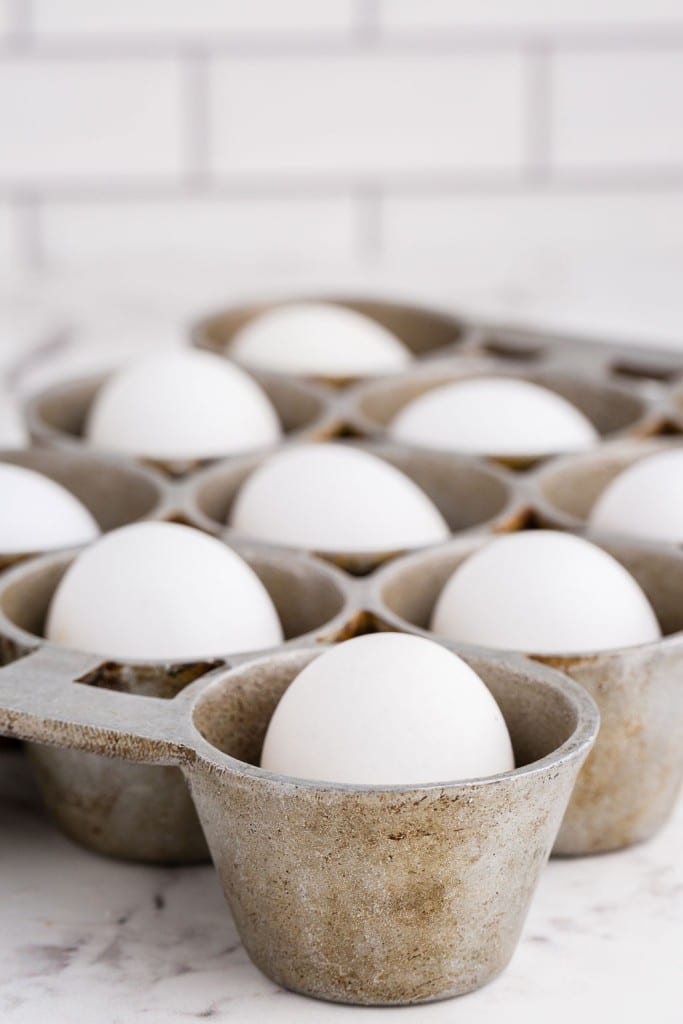
Use your oven to make delicious soft-boiled eggs for recipes like ramen soup or avocado toast. And hard-boiled eggs are perfect for these Skinny Deviled Eggs, Amish potato salad, or other egg recipes. We love a classic egg salad on crackers or egg salad sandwiches!
Making hard-boiled eggs in the oven is a great way to cook up a dozen eggs at a time! We like to cook large batches of eggs. They’re nice to have on hand for a quick nutritious snack or to throw in our favorite recipes.
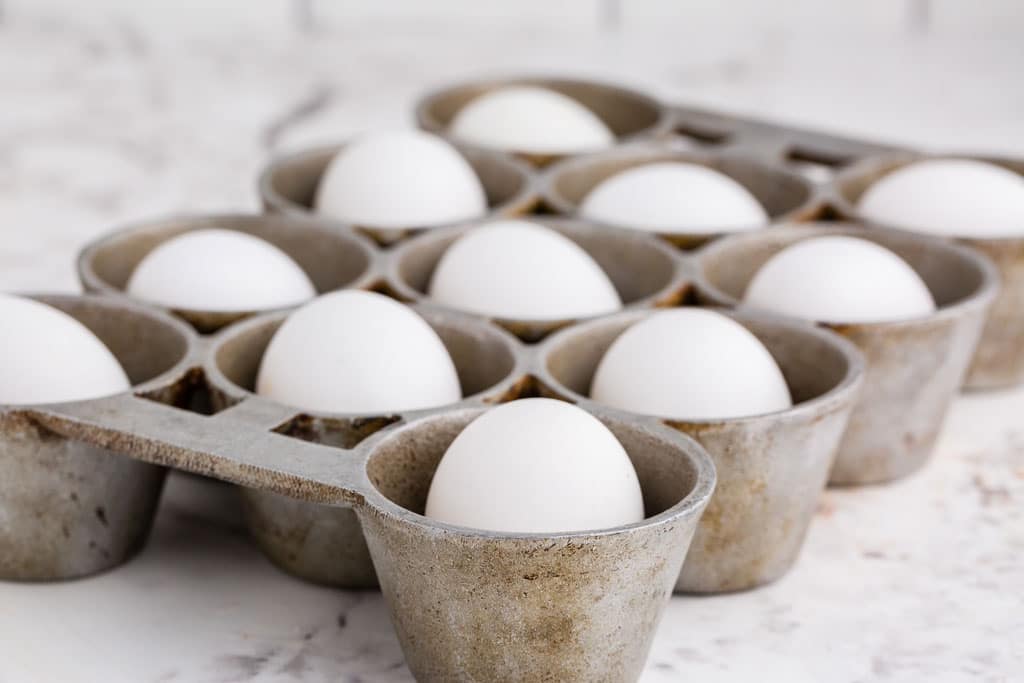
The only time I prefer cooking eggs on the stove top in a pot of boiling water is when I’m making a batch to use for Easter eggs and I want to be absolutely certain there are no spots on the shells (see more about scorch marks and tricks to prevent that down below).
Table of contents
How-To Hard Boil Eggs in the Oven
The process could not be easier! Plunk one egg into each cavity of a muffin tin. Use a measuring cup to pour a little bit of water into each cup. Then bake! That’s it! Set them and forget them. After 30 minutes in the oven you will have absolutely perfect baked eggs!
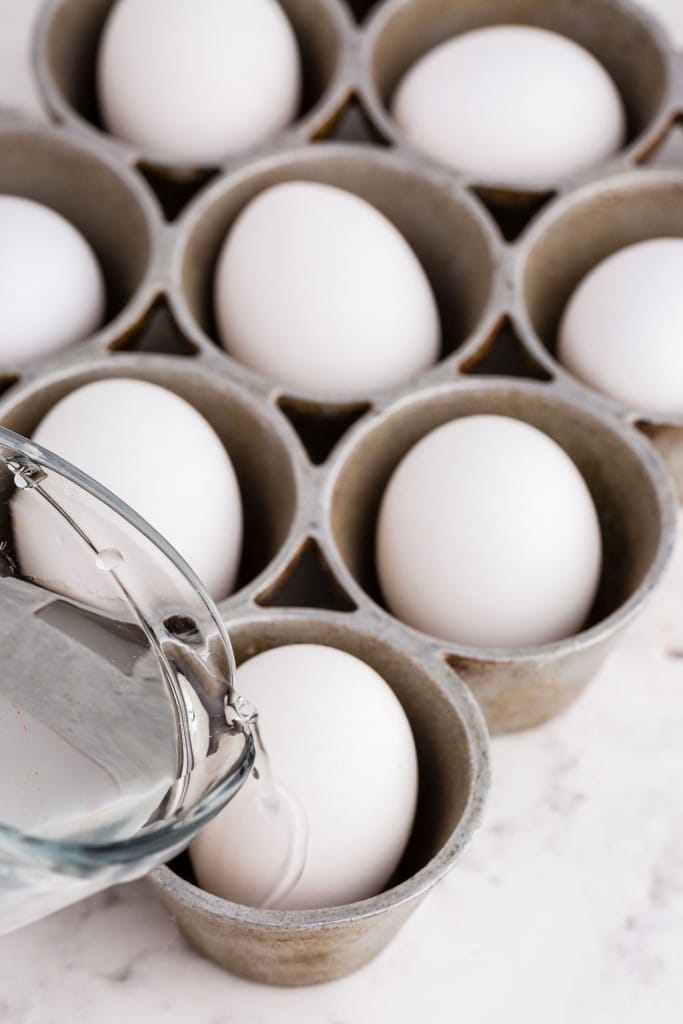
FAQs
Hard-boiled eggs typically store well in the fridge (peeled or unpeeled) for up to 1 week in an airtight container or Ziploc bag.
Do not store your hard-boiled eggs in the freezer as the egg white will become rubbery and inedible. If you want to freeze hard-boiled eggs then rather remove the cooked yolks and freeze those in a Ziploc bag for up to 3 months.
The answer to this depends on how hot your oven runs as well as the size of the fresh eggs used but generally, you’re looking at anywhere between 20-25 minutes of oven time.
For a beautiful soft-boiled egg that isn’t too runny, you’ll need to bake your eggs for about 25 minutes while a soft and runny boiled egg will only need 20 minutes. Then obviously, the closer you reach the 30-minute mark, the harder your boiled egg will be.
If you don’t enjoy peeling hard-boiled eggs due to past difficulty, then here are some great tips that will help you tremendously and make the whole process effortless!
First, always make use of good-quality eggs (not older eggs) that have been chilled in the refrigerator. Once the baking time is up, quickly transfer the eggs to a bowl of ice water or very cold water as this stops the eggs from cooking any further and will assist in peeling them.
You’ll then want to crack each egg gently all over and begin to peel from the end of the egg that has an air pocket. Separate the thin membrane from the egg white itself and the peeling will be a whole lot easier.
It’s my personal experience that fresh farm eggs do not peel well when they are hard-boiled. I think it may be related to the eggs almost being “too fresh”, but that’s just my hunch. When I had chickens, I always had a terrible time trying to peel them and I have heard this same experience countless times from other chicken moms. lol. Anyone else?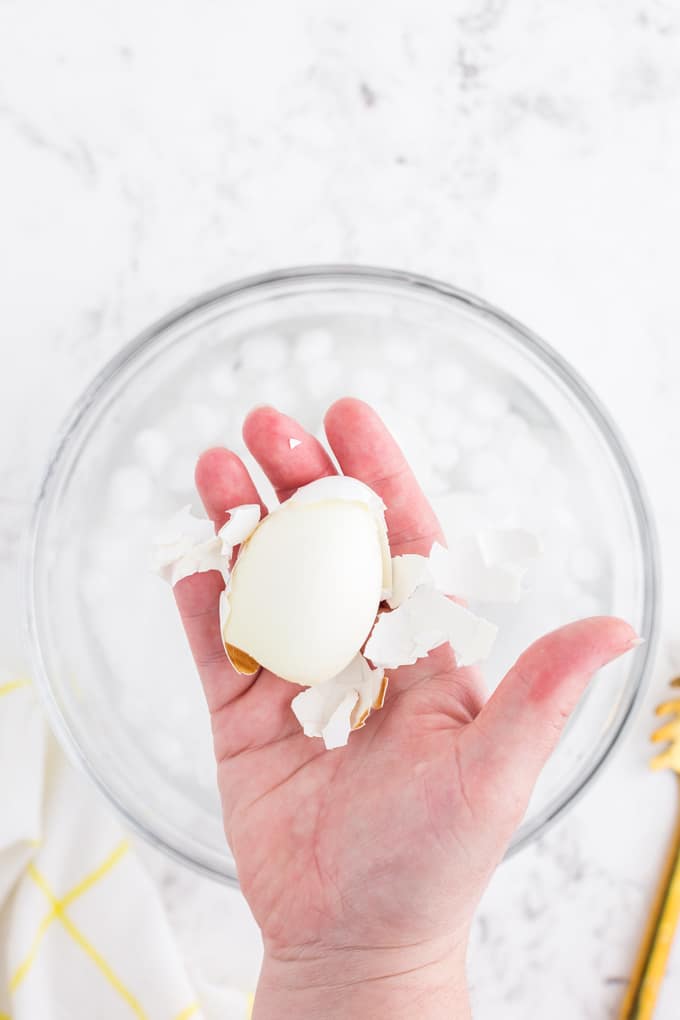
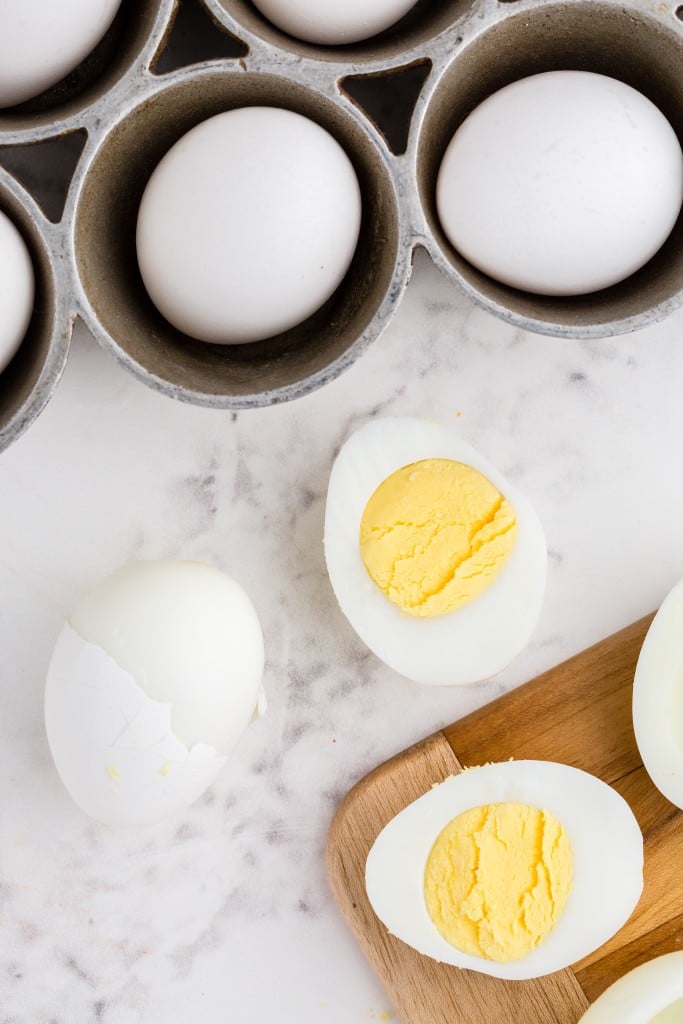
Tips For Making Perfect Hard-Boiled Eggs In The Oven
- If you still find it tricky to peel your eggs even after the icy water application, try peeling them under running water. Let them rest just a few minutes in an ice bath. Then tap gently all over the shell. Finally, peel them submerged under the water in that ice bath!
- Making hard-boiled eggs ahead of time is great if you’re planning a party or event. Store in the fridge and then make some delicious appetizers like these Skinny Deviled Eggs!
- I can confirm that the addition of water in a regular muffin tin helps prevent the shells from forming scorch marks. Sometimes the brown spots (scorch marks) go all the way through the shells and onto the egg white. Though they taste the same, this looks quite dodgy! Take that little extra step of adding water!
- Do note that if you use the oven method without water or with cupcake liners instead of water, the eggs will still taste the same. Also, they’ll cook in the same amount of time as our recommended method.
- You eggs won’t explode using the oven method unless, of course, you really go way beyond the 30 minute mark. I’ve never experienced exploding eggs in the oven while baking them for a maximum of 30 minutes.
- Here’s a tip to make it easy to remove the muffin tin (containing hot water!!) from the oven rack. Set your muffin tin on a baking sheet while cooking then lift out the whole sheet.
- Did you know you can achieve perfect hard-boiled eggs in an instant pot too? Check out our sister site for that how-to!
More Breakfast Recipes You’ll Love
- German Oven Pancakes
- Blackberry Muffins
- Two-minute Breakfast Sandwich Recipe
- Cheesy Sausage Egg Bake
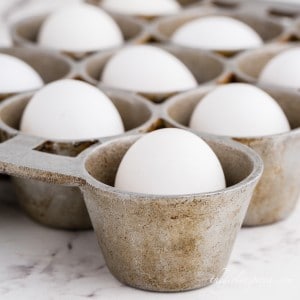
Perfect Hard Boiled Eggs In The Oven
Equipment
- 1 medium bowl filled with ice water
- 1 12-cup muffin tin
Ingredients
- 12 eggs
- 1-2 cups water
Instructions
- Preheat oven to 350°F.
- Place one egg into each cavity of a 12-cup muffin tin.
- Pour water into each cavity to fill about ⅓ of the way.
- Place muffin tin in oven and bake eggs for 30 minutes.
- Remove from the muffin cups (use a large spoon) and place eggs immediately into a large bowl filled with ice water for 2-3 minutes.
- Peel and serve!
Would you like to save this?
Notes
- Eggs peel easiest if peeled under the cold water (right in the ice bath works great) after just a few minutes in the ice bath.
- The water in the muffin tin helps prevent the eggshells from forming scorch marks. I tried this method with the egg in a dry muffin cup and also in a cupcake liner in the muffin cup and both of those left scorch marks all the way through the shells and onto the egg white. But they cook the same with any of these preparations.
Nutrition
Make this recipe?
Share it with me on Instagram @girlinspired1 and follow on Pinterest for more!
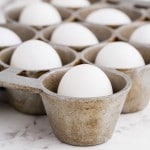
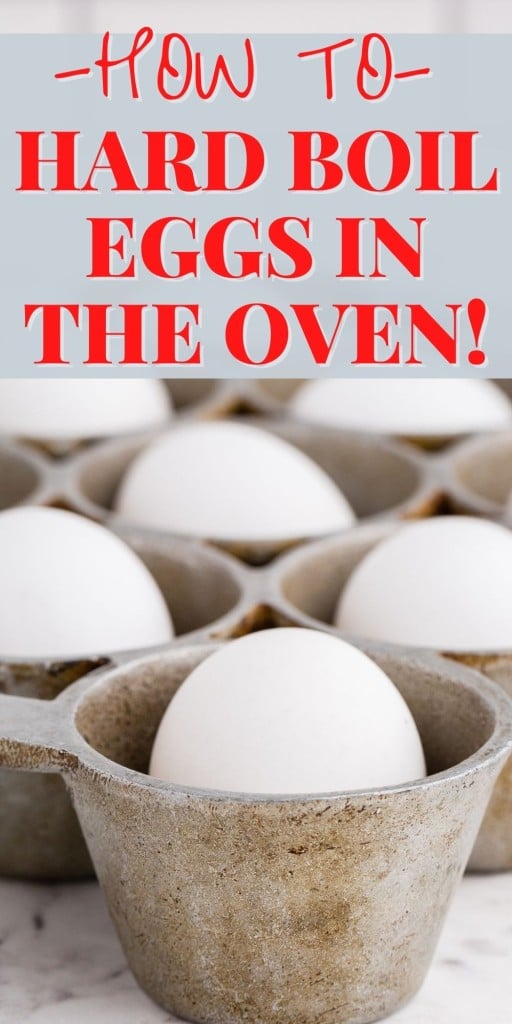
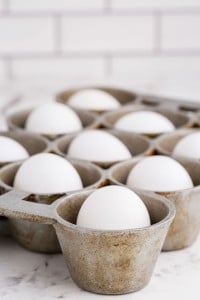
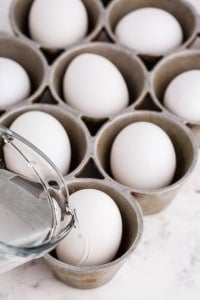
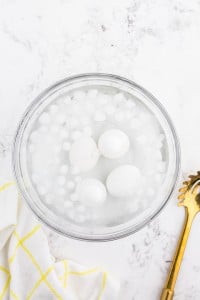
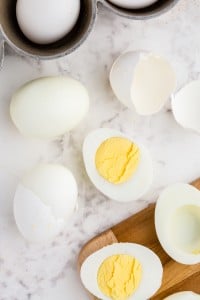
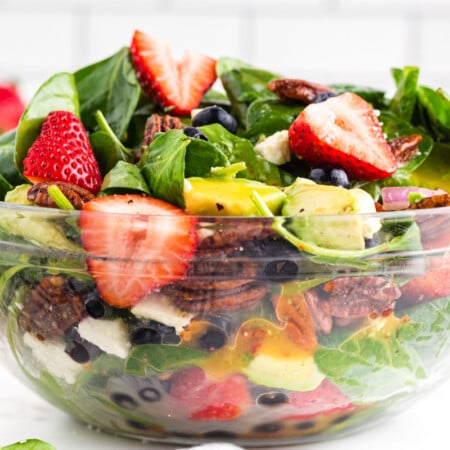
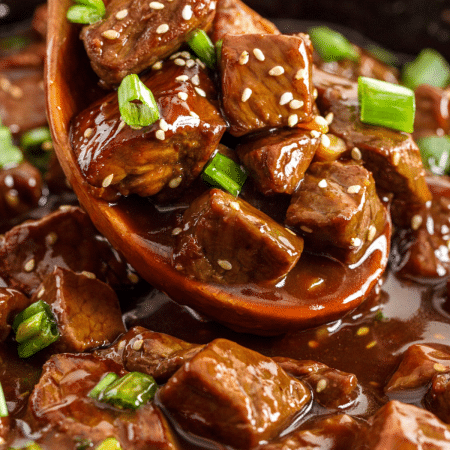







Leave A Reply!